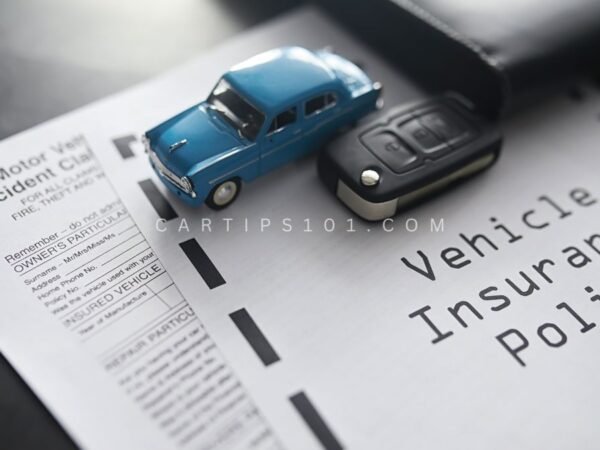When someone passes away while still making payments on a financed car, it can lead to confusion about what happens next. Does the debt vanish? Does the car get repossessed? This article covers everything you need to know about how financed vehicles are handled after the owner's death. Whether you're a family member or friend, understanding these important steps can help you navigate this challenging situation with clarity and confidence.
When someone dies with a financed car, the outstanding loan doesn't just disappear. The responsibility for the remaining balance typically falls to the deceased’s estate. If payments are not made, the lender may repossess the car. Family members or beneficiaries can opt to continue the payments or sell the car to pay off the loan, depending on legal and financial circumstances.
Want to ensure you’re prepared for handling a financed vehicle in the event of a loved one's passing? Keep reading to learn about your options and responsibilities. It’s important to know exactly what steps to take to prevent complications with the lender, and how to manage the situation smoothly during an already difficult time.
Understanding Car Finance After Death
Navigating car finance after the death of an owner can be complex. It is crucial to understand how the estate handles car loans and what happens to the vehicle itself.
Estate Responsibility for Car Loans
When someone dies, their estate is responsible for settling their debts, including any car loans. This means that if the deceased had a financed vehicle, the loan must be paid off by their estate. Typically, the executor of the estate will use the available assets to cover these debts.
If there is a co-signer on the loan, that person might also inherit the responsibility for the remaining balance if the estate does not have sufficient assets to pay off the loan.
| Estate Responsibility | Details |
|---|---|
| Loan Obligation | The estate must pay off the car loan. |
| Co-Signer Impact | Co-signers may assume responsibility if the estate lacks assets. |
Lender Possession of Financed Cars
If the car is still being financed at the time of the owner's death, the lender typically takes possession of the vehicle. This occurs because the vehicle serves as collateral for the loan. Upon the owner's death, ownership of that collateral transfers to the lender.
Auto loans do not simply vanish when the owner dies. Debts are still valid and must be settled. Most car loans include a death clause that outlines the repayment process upon the borrower’s death. Without a clear plan, the car and its payments may become the responsibility of the surviving co-signer or transferred to the estate (Progressive).
| Lender Possession | Details |
|---|---|
| Vehicle Ownership | Lenders reclaim the car as it is collateral for the loan. |
| Loan Terms | Loans remain valid; repayment obligations continue. |
Understanding these aspects of car finance after death can help you navigate the complexities involved, ensuring that the necessary steps are taken to address any outstanding debts and the fate of the vehicle.
Ownership Transfer Scenarios
When it comes to the ownership of a financed car after the owner's death, several scenarios can arise. Understanding these scenarios can help you navigate the complexities of car financing and inheritance.
Paid-Off Car Not in Will
If the car has been fully paid off but was not included in a will, ownership will typically transfer according to the laws of your country. This could mean that the vehicle goes to an appointed executor or administrator, or it might pass directly to any surviving co-owners (Car Finance Saver).
Here is a simplified overview of how ownership might be determined:
| Ownership Scenario | Description |
|---|---|
| Appointed Executor | The executor of the estate may take ownership and manage the vehicle. |
| Surviving Co-Owners | The car may pass directly to surviving co-owners if applicable. |
| State Law | Ownership may also depend on specific state laws regarding inheritance. |
Named Beneficiary in Will
If you have named a beneficiary for the vehicle in your will, the car will typically transfer to that individual upon your passing. This simplifies the process, as the beneficiary will have clear legal rights to the vehicle.
However, if there is an outstanding auto loan at the time of death, the responsibility for paying off that loan may fall to the beneficiary or inheritor. In such cases, the lender may require the vehicle to be refinanced in the new owner's name to transfer responsibility for the loan (Money Fit).
Ownership transfer might look like this:
| Ownership Scenario | Description |
|---|---|
| Beneficiary Receives Car | The named beneficiary receives the vehicle directly. |
| Loan Responsibility | If there is an outstanding loan, the beneficiary assumes responsibility for payments. |
| Refinancing Requirement | The lender may require refinancing to transfer the loan to the new owner. |
In any scenario, it is crucial to consult with a legal expert to understand the specific implications of your situation, as laws and regulations can vary significantly.
Impact on Co-Signers
When a borrower passes away, the situation becomes more complex if there is a co-signer on the auto loan. Understanding the responsibilities and potential actions that may follow is crucial for anyone involved.
Co-Signer Responsibilities
If the auto loan had a co-signer, that individual will become responsible for paying off the remaining balance of the loan. A co-signer is someone who agrees to take on the loan obligations if the primary borrower is unable to make payments. This means that upon the borrower's death, the co-signer must ensure that the loan is paid off to avoid negative impacts on their credit score.
| Scenario | Co-Signer Responsibility |
|---|---|
| Borrower dies | Co-signer must pay remaining loan balance |
| Loan payments are missed | Co-signer's credit may be affected |
| Co-signer pays off the loan | Ownership of the vehicle may transfer to co-signer |
Co-Signer Absence and Lender Actions
In cases where there is no co-signer, the responsibility shifts to the borrower's estate. If the estate does not have enough assets to cover the outstanding debt, the lender may have to write off the loan as a loss. However, lenders typically prefer to work with the borrower's family or estate to find a suitable solution (Money Fit).
| Scenario | Lender Action |
|---|---|
| No co-signer present | Lender may write off loan as a loss |
| Estate has insufficient assets | Lender works with family for a solution |
| Co-signer present | Lender expects co-signer to fulfill loan obligations |
Understanding these dynamics can help you navigate the complexities of car finance after the death of a borrower, ensuring that you are prepared for any responsibilities or actions that may arise.
Handling Leased Vehicles
When a lessee passes away while still in possession of a leased vehicle, specific protocols come into play regarding the lease and any associated financial obligations.
Lease Termination Upon Lessee's Death
In most cases, the lease is automatically terminated upon the death of the lessee. This means that you will not have to continue making monthly lease payments after the lessee's passing (Car Finance Saver). The lease termination process typically involves notifying the leasing company of the lessee's death and providing any required documentation, such as a death certificate.
Early Termination Fees and Payment Obligations
Although the lease is terminated, early termination fees may apply. These fees can range from a few hundred dollars up to several thousand, depending on the terms of the lease agreement. In addition to these fees, any remaining payments still owed on the lease will also need to be settled by the estate or the individual inheriting the vehicle.
| Fee Type | Potential Cost |
|---|---|
| Early Termination Fee | $200 - $3,000 |
| Remaining Lease Payments | Varies based on lease terms |
It's essential to review the lease agreement to understand your specific obligations and any potential fees that may arise after the lessee's death. If no one is available to settle these obligations, the leasing company may take possession of the vehicle.
Financial Solutions and Considerations
When navigating the complexities of car finance after the death of the owner, it's essential to understand potential financial solutions and strategies. This section will explore life insurance for auto loans and loan repayment strategies to help ensure financial stability for your loved ones.
Life Insurance for Auto Loans
One effective way to protect your family from the financial burden of an auto loan in the event of your death is to purchase life insurance. Life insurance policies can provide a payout that can be used to cover the cost of your auto loan after you pass away. This ensures that your family is not left with the responsibility of paying off the loan without your income to support them.
Here are some key benefits of using life insurance for auto loans:
| Benefit | Description |
|---|---|
| Debt Coverage | Life insurance can help cover the remaining balance of an auto loan. |
| Financial Security | Provides peace of mind knowing your family won't face financial strain. |
| Flexible Use | Beneficiaries can use the payout for various expenses, not just loan repayment. |
Loan Repayment Strategies
If the auto loan was not fully paid off at the time of the owner's death, the responsibility for the remaining balance may fall on the spouse or family member who inherits the vehicle. If there is no co-signer, and the borrower's estate does not have enough assets to cover the outstanding debt, the lender may have to write off the loan as a loss. However, lenders typically seek a solution that works for the family or estate (Money Fit).
Here are some strategies for managing loan repayment after the owner's death:
| Strategy | Description |
|---|---|
| Communicate with Lender | Contact the lender to discuss options for loan repayment or restructuring. |
| Evaluate Estate Assets | Determine if the estate has sufficient assets to cover the loan amount. |
| Consider Co-Signer Options | If a co-signer exists, they will be responsible for the remaining balance. |
| Assess Vehicle's Value | If the vehicle's value is less than the loan balance, discuss potential repossession. |
Understanding these financial solutions and strategies can help you navigate the complexities surrounding car finance when someone dies. This proactive approach ensures that your family is prepared and protected from unexpected financial burdens.
Legal Aspects and State Variances
Understanding the legal implications of what happens to a financed car when someone dies involves recognizing how different states handle debts and ownership transfers. The laws can vary significantly, particularly between community property states and others.
Debt Handling in Community Property States
In community property states, debts incurred during marriage are typically the responsibility of both spouses. This includes any outstanding car loans. If a spouse dies with an active car loan, the surviving spouse may be responsible for repaying some or all of that debt. The states that follow this rule include:
| State |
|---|
| Arizona |
| California |
| Idaho |
| Louisiana |
| Nevada |
| New Mexico |
| Texas |
| Washington |
| Wisconsin |
| Alaska |
In these states, any property or assets acquired or loans taken out during the marriage become jointly owned and must be managed collectively by both spouses.
Probate Process and Title Transfer
When the owner of a car with an outstanding loan passes away, the title of the vehicle cannot be transferred until the probate process is completed. During probate, the ownership of the car will be determined, especially if there is no co-borrower or joint owner. Here’s what typically happens:
- The joint owner or inheritor must take the car title and the deceased’s death certificate to their local Department of Motor Vehicles (DMV) for the title transfer.
- If there is no co-borrower, the ownership will be decided through probate, and the title transfer will be delayed until this process is finalized (Forbes).
If you've inherited a car with an outstanding loan, you have several potential options to consider:
- The estate can repay the loan.
- If credit life insurance was purchased by the deceased, it may cover the loan balance.
- You may refinance the car.
- Selling the car to cover the remaining loan balance is also an option (Forbes).
Understanding these legal aspects is essential for anyone navigating the complexities of car finance after the death of a loved one.
Final Thoughts:
What Happens to a Financed Car When Someone Dies?
Dealing with a financed car after the death of a loved one can be tricky, but it’s crucial to handle it properly to avoid legal and financial consequences. Whether the loan is taken over by family, settled through the estate, or the car is repossessed, knowing your rights and responsibilities is key. By being prepared, you can handle the situation more smoothly and ensure the lender gets paid while protecting your family’s interests.
FAQs About "What Happens to a Financed Car When Someone Dies":
Q: Who is responsible for paying the car loan after the owner dies?
A: When the owner of a financed car dies, the responsibility for the loan usually passes to their estate. The executor of the estate will need to handle the remaining payments. Family members or heirs are not personally responsible unless they co-signed the loan.
Q: Can a car be repossessed if the owner dies?
A: Yes, if the car loan is not paid after the owner's death, the lender can repossess the vehicle. The estate or heirs can prevent repossession by continuing payments or settling the loan, depending on the situation.
Q: Can family members take over the financed car after someone dies?
A: Yes, family members can choose to take over the loan if they want to keep the car. This typically involves refinancing or assuming the remaining balance, but it depends on the lender’s policies and the terms of the loan.
Q: What happens if the estate can't pay off the car loan?
A: If the estate doesn't have enough assets to cover the car loan, the lender may repossess the vehicle to recover the remaining debt. In most cases, the remaining debt would not pass to heirs unless they co-signed the loan.
Q: Does insurance cover the car loan if the owner dies?
A: Some people have life insurance or loan protection insurance that covers outstanding debts like car loans. If such coverage exists, it can pay off the loan balance upon the owner's death, preventing the need for family or the estate to cover it.
Image Source: Paid image from CANVA





